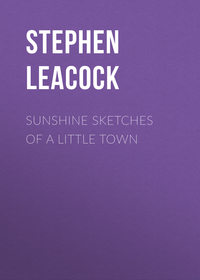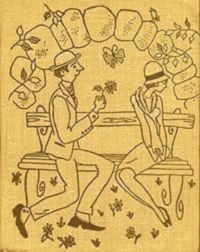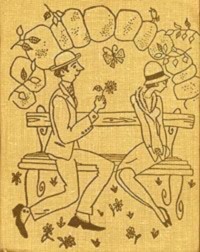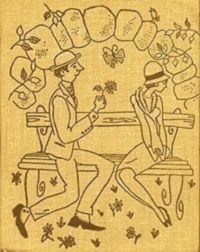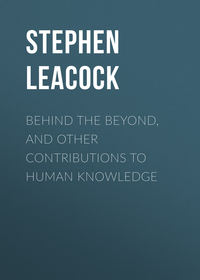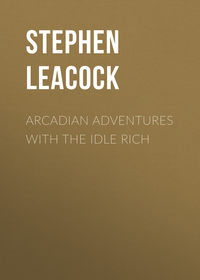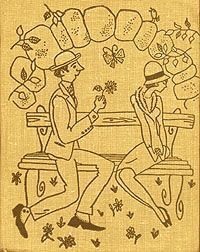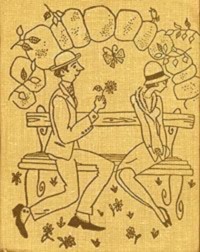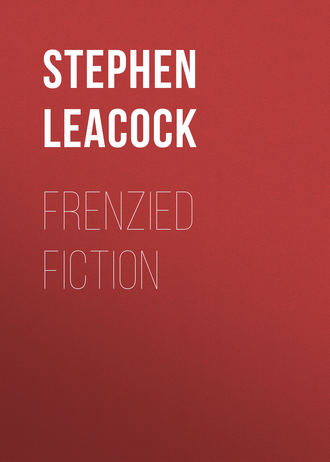 полная версия
полная версияFrenzied Fiction
“An interview?” he said, and we noted with pain the weariness in his tone. “Another interview!”
We bowed.
“Publicity!” he murmured rather to himself than to us. “Publicity! Why must one always be forced into publicity?”
It was not our intention, we explained apologetically, to publish or to print a single word—
“Eh, what?” exclaimed the Great Actor. “Not print it? Not publish it? Then what in—”
Not, we explained, without his consent.
“Ah,” he murmured wearily, “my consent. Yes, yes, I must give it. The world demands it. Print, publish anything you like. I am indifferent to praise, careless of fame. Posterity will judge me. But,” he added more briskly, “let me see a proof of it in time to make any changes I might care to.”
We bowed our assent.
“And now,” we began, “may we be permitted to ask a few questions about your art? And first, in which branch of the drama do you consider that your genius chiefly lies, in tragedy or in comedy?”
“In both,” said the Great Actor.
“You excel then,” we continued, “in neither the one nor the other?”
“Not at all,” he answered, “I excel in each of them.”
“Excuse us,” we said, “we haven’t made our meaning quite clear. What we meant to say is, stated very simply, that you do not consider yourself better in either of them than in the other?”
“Not at all,” said the Actor, as he put out his arm with that splendid gesture that we have known and admired for years, at the same time throwing back his leonine head so that his leonine hair fell back from his leonine forehead. “Not at all. I do better in both of them. My genius demands both tragedy and comedy at the same time.”
“Ah,” we said, as a light broke in upon us, “then that, we presume, is the reason why you are about to appear in Shakespeare?”
The Great Actor frowned.
“I would rather put it,” he said, “that Shakespeare is about to appear in me.”
“Of course, of course,” we murmured, ashamed of our own stupidity.
“I appear,” went on the Great Actor, “in Hamlet. I expect to present, I may say, an entirely new Hamlet.”
“A new Hamlet!” we exclaimed, fascinated. “A new Hamlet! Is such a thing possible?”
“Entirely,” said the Great Actor, throwing his leonine head forward again. “I have devoted years of study to the part. The whole conception of the part of Hamlet has been wrong.”
We sat stunned.
“All actors hitherto,” continued the Great Actor, “or rather, I should say, all so-called actors—I mean all those who tried to act before me—have been entirely mistaken in their presentation. They have presented Hamlet as dressed in black velvet.”
“Yes, yes,” we interjected, “in black velvet, yes!”
“Very good. The thing is absurd,” continued the Great Actor, as he reached down two or three heavy volumes from the shelf beside him. “Have you ever studied the Elizabethan era?”
“The which?” we asked modestly.
“The Elizabethan era?”
We were silent.
“Or the pre-Shakespearean tragedy?”
We hung our head.
“If you had, you would know that a Hamlet in black velvet is perfectly ridiculous. In Shakespeare’s day—as I could prove in a moment if you had the intelligence to understand it—there was no such thing as black velvet. It didn’t exist.”
“And how then,” we asked, intrigued, puzzled and yet delighted, “do you present Hamlet?”
“In brown velvet,” said the Great Actor.
“Great Heavens,” we exclaimed, “this is a revolution.”
“It is. But that is only one part of my conception. The main thing will be my presentation of what I may call the psychology of Hamlet.”
“The psychology!” we said.
“Yes,” resumed the Great Actor, “the psychology. To make Hamlet understood, I want to show him as a man bowed down by a great burden. He is overwhelmed with Weltschmerz. He carries in him the whole weight of the Zeitgeist; in fact, everlasting negation lies on him—”
“You mean,” we said, trying to speak as cheerfully as we could, “that things are a little bit too much for him.”
“His will,” went on the Great Actor, disregarding our interruption, “is paralysed. He seeks to move in one direction and is hurled in another. One moment he sinks into the abyss. The next, he rises above the clouds. His feet seek the ground, but find only the air—”
“Wonderful,” we said, “but will you not need a good deal of machinery?”
“Machinery!” exclaimed the Great Actor, with a leonine laugh. “The machinery of thought, the mechanism of power, of magnetism—”
“Ah,” we said, “electricity.”
“Not at all,” said the Great Actor. “You fail to understand. It is all done by my rendering. Take, for example, the famous soliloquy on death. You know it?”
“‘To be or not to be,’” we began.
“Stop,” said the Great Actor. “Now observe. It is a soliloquy. Precisely. That is the key to it. It is something that Hamlet says to himself. Not a word of it, in my interpretation, is actually spoken. All is done in absolute, unbroken silence.”
“How on earth,” we began, “can you do that?”
“Entirely and solely with my face.”
Good heavens! Was it possible? We looked again, this time very closely, at the Great Actor’s face. We realized with a thrill that it might be done.
“I come before the audience so,” he went on, “and soliloquize—thus—follow my face, please—”
As the Great Actor spoke, he threw himself into a characteristic pose with folded arms, while gust after gust of emotion, of expression, of alternate hope, doubt and despair, swept—we might say chased themselves across his features.
“Wonderful!” we gasped.
“Shakespeare’s lines,” said the Great Actor, as his face subsided to its habitual calm, “are not necessary; not, at least, with my acting. The lines, indeed, are mere stage directions, nothing more. I leave them out. This happens again and again in the play. Take, for instance, the familiar scene where Hamlet holds the skull in his hand: Shakespeare here suggests the words ‘Alas, poor Yorick! I knew him well—‘”
“Yes, yes!” we interrupted, in spite of ourself, “‘a fellow of infinite jest—‘”
“Your intonation is awful,” said the Actor. “But listen. In my interpretation I use no words at all. I merely carry the skull quietly in my hand, very slowly, across the stage. There I lean against a pillar at the side, with the skull in the palm of my hand, and look at it in silence.”
“Wonderful!” we said.
“I then cross over to the right of the stage, very impressively, and seat myself on a plain wooden bench, and remain for some time, looking at the skull.”
“Marvellous!”
“I then pass to the back of the stage and lie down on my stomach, still holding the skull before my eyes. After holding this posture for some time, I crawl slowly forward, portraying by the movement of my legs and stomach the whole sad history of Yorick. Finally I turn my back on the audience, still holding the skull, and convey through the spasmodic movements of my back Hamlet’s passionate grief at the loss of his friend.”
“Why!” we exclaimed, beside ourself with excitement, “this is not merely a revolution, it is a revelation.”
“Call it both,” said the Great Actor.
“The meaning of it is,” we went on, “that you practically don’t need Shakespeare at all.”
“Exactly, I do not. I could do better without him. Shakespeare cramps me. What I really mean to convey is not Shakespeare, but something greater, larger—how shall I express it—bigger.” The Great Actor paused and we waited, our pencil poised in the air. Then he murmured, as his eyes lifted in an expression of something like rapture. “In fact—ME.”
He remained thus, motionless, without moving. We slipped gently to our hands and knees and crawled quietly to the door, and so down the stairs, our notebook in our teeth.
III WITH OUR GREATEST SCIENTIST
As seen in any of our College LaboratoriesIt was among the retorts and test-tubes of his physical laboratory that we were privileged to interview the Great Scientist. His back was towards us when we entered. With characteristic modesty he kept it so for some time after our entry. Even when he turned round and saw us his face did not react off us as we should have expected.
He seemed to look at us, if such a thing were possible, without seeing us, or, at least, without wishing to see us.
We handed him our card.
He took it, read it, dropped it in a bowlful of sulphuric acid and then, with a quiet gesture of satisfaction, turned again to his work.
We sat for some time behind him. “This, then,” we thought to ourselves (we always think to ourselves when we are left alone), “is the man, or rather is the back of the man, who has done more” (here we consulted the notes given us by our editor), “to revolutionize our conception of atomic dynamics than the back of any other man.”
Presently the Great Scientist turned towards us with a sigh that seemed to our ears to have a note of weariness in it. Something, we felt, must be making him tired.
“What can I do for you?” he said.
“Professor,” we answered, “we have called upon you in response to an overwhelming demand on the part of the public—”
The Great Scientist nodded.
“To learn something of your new researches and discoveries in” (here we consulted a minute card which we carried in our pocket) “in radio-active-emanations which are already becoming” (we consulted our card again) “a household word—”
The Professor raised his hand as if to check us.
“I would rather say,” he murmured, “helio-radio-active—”
“So would we,” we admitted, “much rather—”
“After all,” said the Great Scientist, “helium shares in the most intimate degree the properties of radium. So, too, for the matter of that,” he added in afterthought, “do thorium, and borium!”
“Even borium!” we exclaimed, delighted, and writing rapidly in our notebook. Already we saw ourselves writing up as our headline Borium Shares Properties of Thorium.
“Just what is it,” said the Great Scientist, “that you want to know?”
“Professor,” we answered, “what our journal wants is a plain and simple explanation, so clear that even our readers can understand it, of the new scientific discoveries in radium. We understand that you possess, more than any other man, the gift of clear and lucid thought—”
The Professor nodded.
“And that you are able to express yourself with greater simplicity than any two men now lecturing.”
The Professor nodded again.
“Now, then,” we said, spreading our notes on our knee, “go at it. Tell us, and, through us, tell a quarter of a million anxious readers just what all these new discoveries are about.”
“The whole thing,” said the Professor, warming up to his work as he perceived from the motions of our face and ears our intelligent interest, “is simplicity itself. I can give it to you in a word—”
“That’s it,” we said. “Give it to us that way.”
“It amounts, if one may boil it down into a phrase—”
“Boil it, boil it,” we interrupted.
“Amounts, if one takes the mere gist of it—”
“Take it,” we said, “take it.”
“Amounts to the resolution of the ultimate atom.”
“Ha!” we exclaimed.
“I must ask you first to clear your mind,” the Professor continued, “of all conception of ponderable magnitude.”
We nodded. We had already cleared our mind of this.
“In fact,” added the Professor, with what we thought a quiet note of warning in his voice, “I need hardly tell you that what we are dealing with must be regarded as altogether ultramicroscopic.”
We hastened to assure the Professor that, in accordance with the high standards of honour represented by our journal, we should of course regard anything that he might say as ultramicroscopic and treat it accordingly.
“You say, then,” we continued, “that the essence of the problem is the resolution of the atom. Do you think you can give us any idea of what the atom is?”
The Professor looked at us searchingly.
We looked back at him, openly and frankly. The moment was critical for our interview. Could he do it? Were we the kind of person that he could give it to? Could we get it if he did?
“I think I can,” he said. “Let us begin with the assumption that the atom is an infinitesimal magnitude. Very good. Let us grant, then, that though it is imponderable and indivisible it must have a spacial content? You grant me this?”
“We do,” we said, “we do more than this, we give it to you.”
“Very well. If spacial, it must have dimension: if dimension—form. Let us assume ex hypothesi the form to be that of a spheroid and see where it leads us.”
The Professor was now intensely interested. He walked to and fro in his laboratory. His features worked with excitement. We worked ours, too, as sympathetically as we could.
“There is no other possible method in inductive science,” he added, “than to embrace some hypothesis, the most attractive that one can find, and remain with it—”
We nodded. Even in our own humble life after our day’s work we had found this true.
“Now,” said the Professor, planting himself squarely in front of us, “assuming a spherical form, and a spacial content, assuming the dynamic forces that are familiar to us and assuming—the thing is bold, I admit—”
We looked as bold as we could.
“Assuming that the ions, or nuclei of the atom—I know no better word—”
“Neither do we,” we said.
“That the nuclei move under the energy of such forces, what have we got?”
“Ha!” we said.
“What have we got? Why, the simplest matter conceivable. The forces inside our atom—itself, mind you, the function of a circle—mark that—”
We did.
“Becomes merely a function of pi!”
The Great Scientist paused with a laugh of triumph.
“A function of pi!” we repeated in delight.
“Precisely. Our conception of ultimate matter is reduced to that of an oblate spheroid described by the revolution of an ellipse on its own minor axis!”
“Good heavens!” we said. “Merely that.”
“Nothing else. And in that case any further calculation becomes a mere matter of the extraction of a root.”
“How simple,” we murmured.
“Is it not,” said the Professor. “In fact, I am accustomed, in talking to my class, to give them a very clear idea, by simply taking as our root F—F being any finite constant—”
He looked at us sharply. We nodded.
“And raising F to the log of infinity. I find they apprehend it very readily.”
“Do they?” we murmured. Ourselves we felt as if the Log of Infinity carried us to ground higher than what we commonly care to tread on.
“Of course,” said the Professor, “the Log of Infinity is an Unknown.”
“Of course,” we said very gravely. We felt ourselves here in the presence of something that demanded our reverence.
“But still,” continued the Professor almost jauntily, “we can handle the Unknown just as easily as anything else.”
This puzzled us. We kept silent. We thought it wiser to move on to more general ground. In any case, our notes were now nearly complete.
“These discoveries, then,” we said, “are absolutely revolutionary.”
“They are,” said the Professor.
“You have now, as we understand, got the atom—how shall we put it?—got it where you want it.”
“Not exactly,” said the Professor with a sad smile.
“What do you mean?” we asked.
“Unfortunately our analysis, perfect though it is, stops short. We have no synthesis.”
The Professor spoke as in deep sorrow.
“No synthesis,” we moaned. We felt it was a cruel blow. But in any case our notes were now elaborate enough. We felt that our readers could do without a synthesis. We rose to go.
“Synthetic dynamics,” said the Professor, taking us by the coat, “is only beginning—”
“In that case—” we murmured, disengaging his hand.
“But, wait, wait,” he pleaded “wait for another fifty years—”
“We will,” we said very earnestly. “But meantime as our paper goes to press this afternoon we must go now. In fifty years we will come back.”
“Oh, I see, I see,” said the Professor, “you are writing all this for a newspaper. I see.”
“Yes,” we said, “we mentioned that at the beginning.”
“Ah,” said the Professor, “did you? Very possibly. Yes.”
“We propose,” we said, “to feature the article for next Saturday.”
“Will it be long?” he asked.
“About two columns,” we answered.
“And how much,” said the Professor in a hesitating way, “do I have to pay you to put it in?”
“How much which?” we asked.
“How much do I have to pay?”
“Why, Professor—” we began quickly. Then we checked ourselves. After all was it right to undeceive him, this quiet, absorbed man of science with his ideals, his atoms and his emanations. No, a hundred times no. Let him pay a hundred times.
“It will cost you,” we said very firmly, “ten dollars.”
The Professor began groping among his apparatus. We knew that he was looking for his purse.
“We should like also very much,” we said, “to insert your picture along with the article—”
“Would that cost much?” he asked.
“No, that is only five dollars.”
The Professor had meantime found his purse.
“Would it be all right,” he began, “that is, would you mind if I pay you the money now? I am apt to forget.”
“Quite all right,” we answered. We said good-bye very gently and passed out. We felt somehow as if we had touched a higher life. “Such,” we murmured, as we looked about the ancient campus, “are the men of science: are there, perhaps, any others of them round this morning that we might interview?”
IV. WITH OUR TYPICAL NOVELISTS
Edwin and Ethelinda Afterthought—Husband and Wife—In their Delightful Home Life.
It was at their beautiful country place on the Woonagansett that we had the pleasure of interviewing the Afterthoughts. At their own cordial invitation, we had walked over from the nearest railway station, a distance of some fourteen miles. Indeed, as soon as they heard of our intention they invited us to walk. “We are so sorry not to bring you in the motor,” they wrote, “but the roads are so frightfully dusty that we might get dust on our chauffeur.” This little touch of thoughtfulness is the keynote of their character.
The house itself is a delightful old mansion giving on a wide garden, which gives in turn on a broad terrace giving on the river.
The Eminent Novelist met us at the gate. We had expected to find the author of Angela Rivers and The Garden of Desire a pale aesthetic type (we have a way of expecting the wrong thing in our interviews). We could not resist a shock of surprise (indeed we seldom do) at finding him a burly out-of-door man weighting, as he himself told us, a hundred stone in his stockinged feet (we think he said stone).
He shook hands cordially.
“Come and see my pigs,” he said.
“We wanted to ask you,” we began, as we went down the walk, “something about your books.”
“Let’s look at the pigs first,” he said. “Are you anything of a pig man?”
We are always anxious in our interviews to be all things to all men. But we were compelled to admit that we were not much of a pig man.
“Ah,” said the Great Novelist, “perhaps you are more of a dog man?”
“Not altogether a dog man,” we answered.
“Anything of a bee man?” he asked.
“Something,” we said (we were once stung by a bee).
“Ah,” he said, “you shall have a go at the beehives, then, right away?”
We assured him that we were willing to postpone a go at the beehives till later.
“Come along, then, to the styes,” said the Great Novelist, and he added, “Perhaps you’re not much of a breeder.”
We blushed. We thought of the five little faces around the table for which we provide food by writing our interviews.
“No,” we said, “we were not much of a breeder.”
“Now then,” said the Great Novelist as we reached our goal, “how do you like this stye?”
“Very much indeed,” we said.
“I’ve put in a new tile draining—my own plan. You notice how sweet it keeps the stye.”
We had not noticed this.
“I am afraid,” said the Novelist, “that the pigs are all asleep inside.”
We begged him on no account to waken them. He offered to open the little door at the side and let us crawl in. We insisted that we could not think of intruding.
“What we would like,” we said, “is to hear something of your methods of work in novel writing.” We said this with very peculiar conviction. Quite apart from the immediate purposes of our interview, we have always been most anxious to know by what process novels are written. If we could get to know this, we would write one ourselves.
“Come and see my bulls first,” said the Novelist. “I’ve got a couple of young bulls here in the paddock that will interest you.”
We felt sure that they would.
He led us to a little green fence. Inside it were two ferocious looking animals, eating grain. They rolled their eyes upwards at us as they ate.
“How do those strike you?” he asked.
We assured him that they struck us as our beau ideal of bulls.
“Like to walk in beside them?” said the Novelist, opening a little gate.
We drew back. Was it fair to disturb these bulls?
The Great Novelist noticed our hesitation.
“Don’t be afraid,” he said. “They’re not likely to harm you. I send my hired man right in beside them every morning, without the slightest hesitation.”
We looked at the Eminent Novelist with admiration. We realized that like so many of our writers, actors, and even our thinkers, of to-day, he was an open-air man in every sense of the word.
But we shook our heads.
Bulls, we explained, were not a department of research for which we were equipped. What we wanted, we said, was to learn something of his methods of work.
“My methods of work?” he answered, as we turned up the path again. “Well, really, I hardly know that I have any.”
“What is your plan or method,” we asked, getting out our notebook and pencil, “of laying the beginning of a new novel?”
“My usual plan,” said the Novelist, “is to come out here and sit in the stye till I get my characters.”
“Does it take long?” we questioned.
“Not very. I generally find that a quiet half-hour spent among the hogs will give me at least my leading character.”
“And what do you do next?”
“Oh, after that I generally light a pipe and go and sit among the beehives looking for an incident.”
“Do you get it?” we asked.
“Invariably. After that I make a few notes, then go off for a ten mile tramp with my esquimaux dogs, and get back in time to have a go through the cattle sheds and take a romp with the young bulls.”
We sighed. We couldn’t help it. Novel writing seemed further away than ever.
“Have you also a goat on the premises?” we asked.
“Oh, certainly. A ripping old fellow—come along and see him.”
We shook our heads. No doubt our disappointment showed in our face. It often does. We felt that it was altogether right and wholesome that our great novels of to-day should be written in this fashion with the help of goats, dogs, hogs and young bulls. But we felt, too, that it was not for us.
We permitted ourselves one further question.
“At what time,” we said, “do you rise in the morning?”
“Oh anywhere between four and five,” said the Novelist.
“Ah, and do you generally take a cold dip as soon as you are up—even in winter?”
“I do.”
“You prefer, no doubt,” we said, with a dejection that we could not conceal, “to have water with a good coat of ice over it?”
“Oh, certainly!”
We said no more. We have long understood the reasons for our own failure in life, but it was painful to receive a renewed corroboration of it. This ice question has stood in our way for forty-seven years.
The Great Novelist seemed to note our dejection.
“Come to the house,” he said, “my wife will give you a cup of tea.”
In a few moments we had forgotten all our troubles in the presence of one of the most charming chatelaines it has been our lot to meet.
We sat on a low stool immediately beside Ethelinda Afterthought, who presided in her own gracious fashion over the tea-urn.
“So you want to know something of my methods of work?” she said, as she poured hot tea over our leg.
“We do,” we answered, taking out our little book and recovering something of our enthusiasm. We do not mind hot tea being poured over us if people treat us as a human being.


